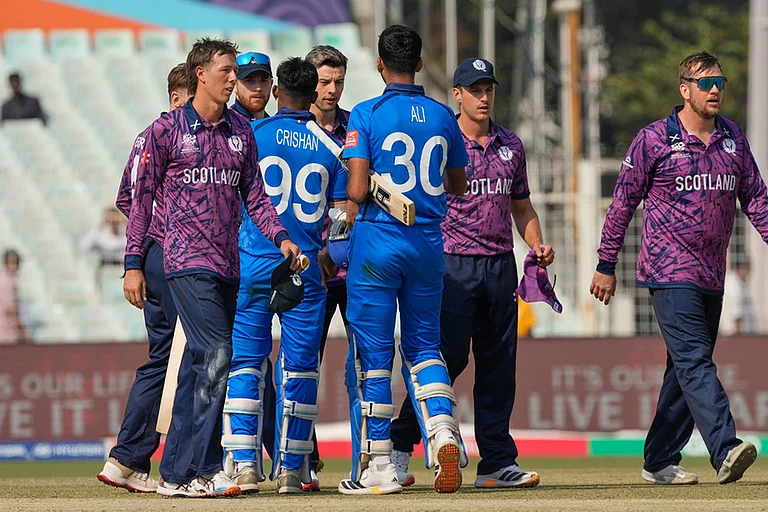What's next for India-Pakistan relations after the Kargil crisis? One option is unending, foreign-backed insurgency. Another option is substantive bilateral discussions with Pakistan on many issues, including serious addressal of the Kashmir dispute. If other wrenching, long-festering conflicts are any guide, a third option seems most likely: a mixture of diplomacy amidst continuing violence.
Jawaharlal Nehru predicted that the Kashmir issue would become more soluble over time. Would that this were true. Peace-making between '72 and '89, when Kashmir was quiet and when diplomatic initiatives might have borne fruit, was regrettably not undertaken by India's leaders. Since '89, a resolution of the Kashmir dispute has obviously become more difficult. In recent years, successes of the Indian army in dealing with foreign-backed insurgency have coincided with a deteriorating situation in Pakistan. If negative trend lines within Pakistan continue, continued successes by Indian security forces will be completely insufficient to ensure a peaceful resolution of the Kashmir issue.
In this context, cross-LoC operations cannot be ruled out in the future, as some spokespersons for the Pakistani government have already stated. Smaller hit-and-run operations by jihadists are a given. What is the Indian government to do? A lengthy rejection of bilateral initiatives because of the Kargil operation would certainly be understandable, but how would this serve India's national security interests?
Feelings within India of bitterness and betrayal are completely understandable: the brazen hijacking of the work plan established at Lahore surprised everyone who supported the bus diplomacy. Given the fractious nature of Indian politicsóespecially during a national political campaignóit could take considerable time and effort to pick up the pieces from Lahore.
A lengthy period without bilateral engagement, however, would likely be filled by acts of violence that make progress in India-Pakistan relations and movement toward a resolution of the Kashmir dispute even more remote. The troubling trend lines within Pakistan confirm in Kashmir what has also been true in Northern Ireland and Gaza: the longer a problem of this kind festers, the more difficult it becomes to resolve. In the absence of creative initiatives, cadres of well-armed irreconciliables grow in number. In the case of Kashmir, the jihadists-in-training appear quite willing to replace those killed by Indian security forces. They are especially active when political developments threaten to marginalise the 'cause'. Stalemate provides sustenance; new diplomatic initiatives pose more of a threat than counter-insurgency sweeps.
During the intense weeks of conflict over Kargil, the Indian government asked the international community not to interfere in a bilateral matteróa position that was all the more persuasive because of New Delhi's decision to accept higher casualties by avoiding dangerous escalatory steps across the LoC. The Clinton administration appreciated India's dilemma and restraint, as did Beijing and many foreign capitals.
New Delhi would lose the support it has won abroad to keep the Kashmir issue in bilateral channels if the next government delays the resumption of discussions with Pakistan and if it adopts a perfunctory approach to the Kashmir dispute once talks are resumed. If this were to happen, the next time Kashmir flares upóand there will be a next timeóforeign capitals may not be as sympathetic to India's stance on the necessity for bilateralism.
The next government in India will, therefore, sit on the horns of a post-Kargil dilemma: India has many reasons to feel aggrieved and to turn its back on the Lahore Declaration. But India also has many reasons to pursue this work programme with renewed commitment. How many reasons?
One can begin by counting the soldiers who died in the Kargil operation to preserve the 'sanctity' of the LoC. Why did these men make the ultimate sacrifice, and why are their families now grieving? So that those not in the line of fire can retain political cover of maximalist positions?
Asecond post-Kargil dilemma inexorably follows: if the next Indian government decides to engage in substantive bilateral talks and tables new ideas, counter-moves by jihadists will follow as night follows day. But negative developments concerning Kashmir are now likely to occur in any event; at issue is whether India can successfully engineer countervailing diplomatic and political developments. If the next government in India can develop a consensus approach to propose new initiatives on Kashmir, Pakistan is likely to react negatively, since the dangers of falling off maximalist positions are far greater there than in India. But the tabling of new ideas on Kashmir could well serve Indian interests internationally, demonstrating New Delhi's commitment to a bilateral solution, isolating irreconciliable groups, and shifting the focus on Pakistan to adopt new initiatives of its own.
India's decision to test nuclear weapons, the Kargil operation and Pakistan's growing difficulties belie confident assertions of a return to 'normalcy' in Kashmir. As the Israeli, British, and Irish authorities have discovered, the best way to marginalise those who oppose peace is to demonstrate a willingness to move toward a diplomatic solution while maintaining a tough military posture against terrorism. If India's political leaders cannot meet this extraordinarily difficult challenge, disproportionate burdens will continue to fall on India's security forces and on Kashmiris.
(Michael Krepon is president of the Washington-based think- tank, the Henry L. Stimson Centre.)


























